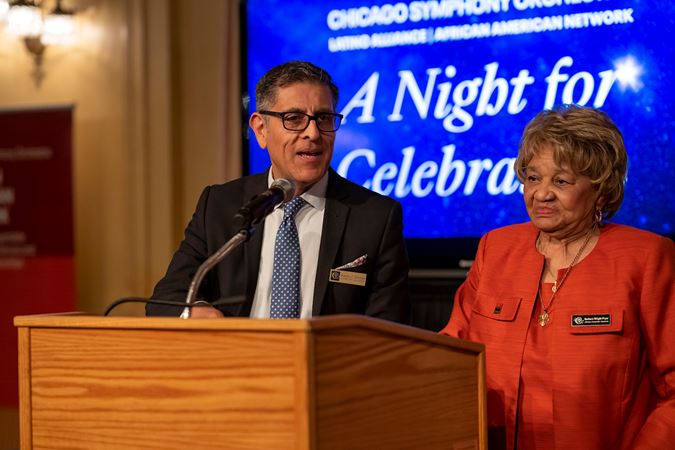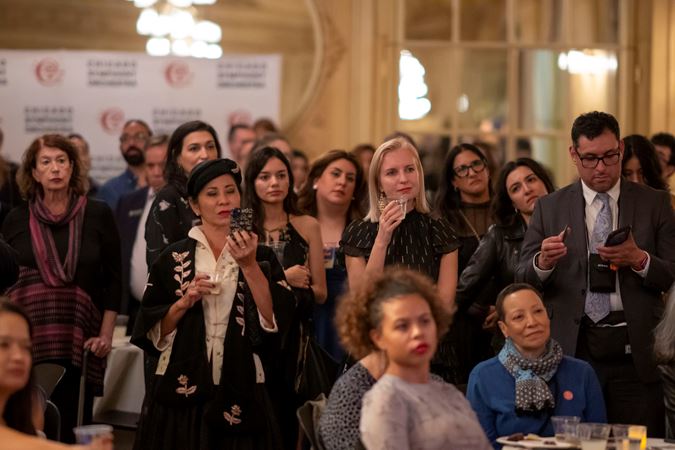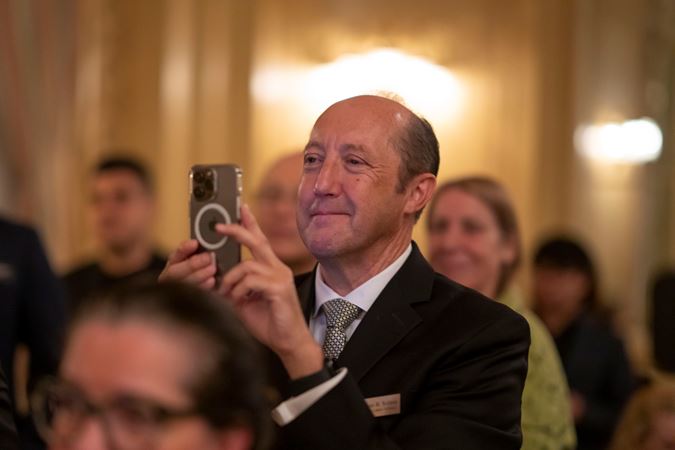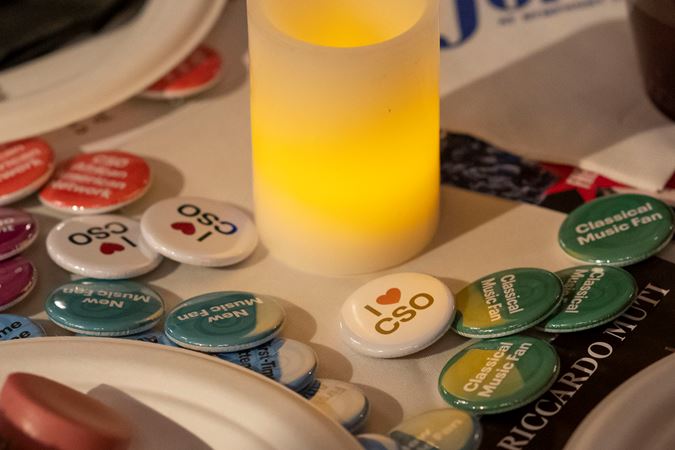Riccardo Muti appears at "A Night for Celebration," presented by the Latino Alliance and African American Network. Greeting him are Barbara Wright-Pryor and Latino Alliance co-chairs Ramiro J. Atristaín-Carrión and Rina Magarici.
Todd Rosenberg Photography
At a festive Night for Celebration, Riccardo Muti thanked members of the Latino Alliance and African American Network, reminding them that “what you are doing for the orchestra, for the musical culture in this city, is extremely important.”
The event, held June 15 after the concert in which Muti led the Chicago Symphony Orchestra in works by J. Strauss Jr., Schifrin and Schubert, drew a capacity crowd to Grainger Ballroom. Latino Alliance and African American Network members organized the event to honor Muti as he ends his acclaimed 13-year tenure as CSO music director.
Before the Muti arrived, Latino Alliance co-chair Ramiro J. Atristaín-Carrión told the crowd, “We celebrate his tenure with immense gratitude, profound respect and deep admiration.” Representing the AAN, board member Barbara Wright-Pryor said, “We are so happy that you are here. The African American Network and Latino Alliance came together to promote music, and we invite you to join us. The only requirements are to love music and support the CSO.”
Jeff Alexander, president of the Chicago Symphony Orchestra Association, said, “Thank you so much for being with us. We’re so pleased to have you here. We want you to make this building your musical home.”
Then Muti as entered the room, Atristaín-Carrión said, “Dear Maestro, you have been the heart and soul of this orchestra. Whether conducting symphonies and concerts or embracing the silence between the notes, you have engaged audiences and turned music into languages that transcend barriers. Your unwavering commitment to the CSO and belief in the power of music have been an inspiration to us all.”
He then repeated his remarks in Italian and added, “We are eternally grateful for the privilege of your leadership. You have contributed greatly to maintaining the Chicago Symphony Orchestra as one of the world’s greatest.”
Taking the lectern, Muti said, “When I came here, the CSO was a great orchestra. I didn’t make it great, it was great before. Maybe I brought to the orchestra a little bit of the Mediterranean sunshine, of the Italian light. I am very happy about what has been a wonderful collaboration for so many years with these wonderful musicians. But we must not forget that the world, as you know, is in an incredibly, terrifying situation. There is no place where you can feel safe.
“So we all have to work to help to create peace and brotherhood, but not only with vague words but with facts. And the fact is that in Chicago, you have a great orchestra, one of the two or three greatest orchestras in the world.” Then he added with a laugh, “Don’t ask me who are the other two.”
He then brought up an anecdote involving Sir Georg Solti, the eighth music director of the Chicago Symphony. “When he was asked who are the best opera conductors in the world, Solti said, ‘Karajan, Bernstein and Solti and not necessarily in this order.’ ” Then referring to his earlier remark of not asking him about other great orchestras, Muti said, “For me, the CSO is the first.”
Muti also spoke about the role of the Chicago Symphony in the world at large. “The orchestra can be, has been, will be, shall be the one of the most important ambassadors of the cultures of this country,” he said. “Being European, and not only European but Italian, and not only Italian but southern Italian, I must say that many times unfortunately in Europe, the image of the United States is of a country of weapons, violence, etc. This is an impression that is wrong, but this is a country that should [promote] more in the world about the important things that this country produces — culture, music, art, science, medicine. The Chicago Symphony has been but could be [even more] of an ambassador of musical culture. To play concerts around the world doesn’t solve the problem, but it helps.”
As part of his own acts of cultural diplomacy, Muti established his annual Roads of Friendship in 1997. A project of Muti’s Ravenna Festival, it aims to bring the healing power of music to nations in conflict. In July, he and his Luigi Cherubini Youth Orchestra will perform in Jerash, near Amman, Jordan, and the Syrian border. “We go there to give people who are troubled, who suffer, to feel that somewhere, somebody, some people care. And will help.”
Despite his many accolades and accomplishments, Muti does not need to be validated by applause. “At a certain point of your life, your career, it’s not the minutes of applause that make you happy,” he said. “You have seen that after two or three times, I do this [his signature wave goodbye], and I say to the musicians in front of me, ‘and now, pizza e birra’ [pizza and beer].
“I don’t belong to the [group] of conductors who measure [success] by applause. They kiss the second violin, the fourth contrabasso [double bass], they shake hands with the second oboe, until the conductor goes completely around the orchestra. And then the typical journalist, especially in Europe, will write, ‘16 minutes of applause, 12 minutes of applause, 10 minutes of applause.’ For me, three times [the number of bows] and then basta! That’s enough. It is not a question of arrogance. We play for you, to give you, like all musicians try their best not to sound just perfect, but they also give your their soul. It’s an exchange of spiritual messages between the players and the public.”
Then he issued his challenge to the crowd. “I hope you will help the next generation come to hear the Chicago Symphony. Around the world, as we have said many times, to hear the Chicago Symphony, they fight to get tickets. We are always sold out when we go [on tour]. Here, I don’t think the young people [realize] what they have. When you are in contact with great quality every day … you might not appreciate it.
“Don’t go in this direction. Just stay close to this great orchestra. And the institution [the CSOA] is doing its part, but we need also your help, which until now, has been so important. I thank all of you for what you have done and what you will do in the future. And now I will say, ‘pizza e birra.’ ”






